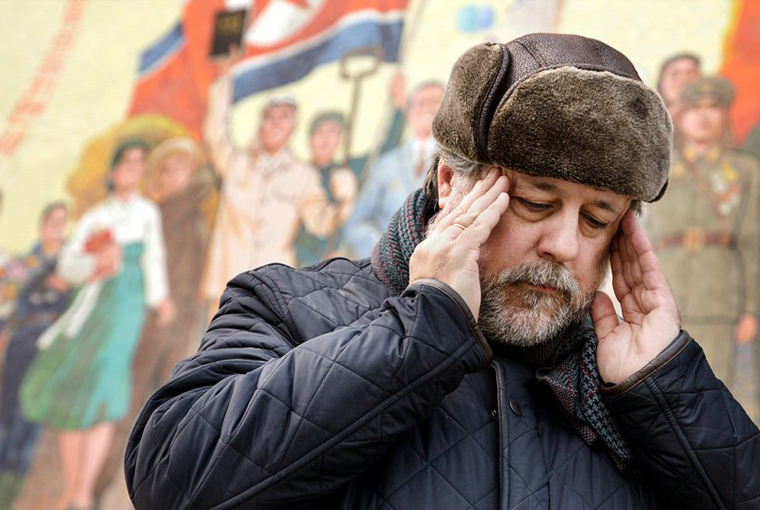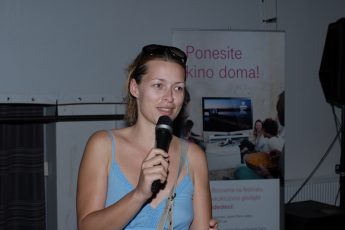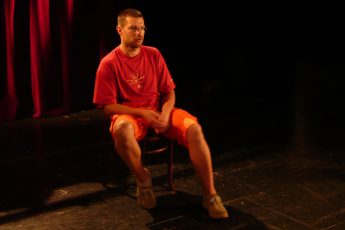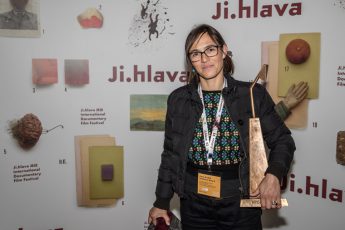
We met Documentary filmmaker Vytaly Mansky at this year’s Thessaloniki Documentary Film Festival. He discusses his North Korean-set film “Under the Sun”, which offers fascinating views of the country behind its widely documented facade.
How much time do you spend on a topic and with your subjects before filming?
It depends. Sometimes I spend all my conscious and unconscious life with my heroes, as was the case with Close Relations (Rodnye) when I was filming my mom. And sometimes you just see a person and understand at that very second that he will become a hero in your next film. Maybe not the main hero but that at least a part of the film will be related to him is absolutely clear. It happened to me with the film Pipeline for example. We were traveling from Europe to Asia, beyond the Arctic circle and back and on the way we met quite a few people who would become characters in the film. I remember for instance that we stopped over in a small town on the Russian-Ukrainian border and saw a brass orchestra of some drunk elderly guys getting out of an old Lada car and entering a building. I got very curious and followed them and found out that they were coming back from a funeral – this is the way they earn their living – and the next day we shot them and they became part of one of Pipeline‘s episodes. So, all the time when I am not, say, only traveling, but going through life, any person that can happen to be with me in the lift can subsequently become a hero in my film.
Many of your films explore the subtle ways in which geopolitics affect the everyday life of ordinary people. How much impact do you think politics has on our lives? How can it be seen?
This question saddens me because I would like to say “No, politics doesn’t affect our lives, there’s no politics in my films” and in general I would like to dedicate myself solely to art. But unfortunately, documentary cinema is closely connected to real life. And real life is politicized – I don’t want to say that it is like that today, because the truth is that it has always been like this. If we look at classical Greek or Roman poems, or Shakespeare – what his plays are based on, the great plays such as Hamlet or King Lear – it is always about politics.
What do you think is the influence you have as a film team on the subjects you are filming?
My aim is to minimize the influence on the characters. Although we all understand that our behavior in a flat when we are alone and when we are in a presence of someone, even a very close person, is different… A woman when she is on her own will behave one way, and another way when she is with her husband, lover, or son. And with films, we are talking about complete strangers, a film crew who will retell and show your behavior to an enormous audience. This is a very difficult task: to enter a life of somebody in a way that will not change it. I work on it a lot and sometimes I feel I’ve succeeded. And I always feel very happy when I see that I managed to film life without changing its form. And of course, documentary films are very dependent on technology. All new forms of documentary filmmaking are related to and induced by changes in the technology of shooting. Cinéma-verité appeared with the 16mm sound recording cameras. And the new documentary cinema, fully immersed in life, emerged alongside digital technology. Let’s take a look at documentary cinematography of the film era. To shoot a breakfast scene in a flat it would take two technical assistants to install the heavy camera on a tripod, a sound technician with full equipment (because the camera didn’t record the sound), a lighting technician to install the lights and improve the interiors’ light conditions as the film sensitivity was low. You could record only 10 minute long sequences at a time when the director had to discuss with the participants of the scene beforehand who was to say what and in what order because a) you’ve only got 10 minutes, and b) the film stock is very expensive. So imagine how people would behave when there are at least 6 strangers coming into their flat, shuffling everything (for their set up), fixing every detail of how people are supposed to behave. How can you possibly get to shoot anything close to the reality of life? And now when you arrive alone, set up a camera and then may not touch it for several hours while it continues filming, of course it allows you to approach people differently. They start to feel differently and it is not a question of skill anymore but mostly of the technology. So I would like to stress that technology today changed the language of documentary films in a radical way.
Do you think everyday North Koreans have different ways of expressing their discontent or is everybody brainwashed? Does cultural difference play a part?
I don’t mean to offend anyone but this question clearly comes from a person whose position is based on the Western view of what a dictatorship looks like. The paradox is that the society of North Korea is composed to 100% of people who have no idea that another form of existence is possible. For them the question of accepting or refusing the system of values that (in)forms their lives simply doesn’t exist. This system is the only possible one and the only one they know. For them their way of existence is absolutely natural and they are simply ignorant of the fact that one can be critical towards it. They don’t even have fear. In the USSR people were afraid because they knew – I’ll make an example. In 1937 a 40 year old person is sentenced and sent to a GULAG. In 1917, he was 20 years old. For the first 20 years of his life this person had lived a completely different life so that in 1937 he is fully aware of what is happening around him. All people living in North Korea today were born into this system, they can’t be afraid because they don’t even understand what it is. Here lies the tragedy and the horror of what’s happening in North Korea nowadays.
Translated from Russian by Ivanka Polchenko




Leave a Comment